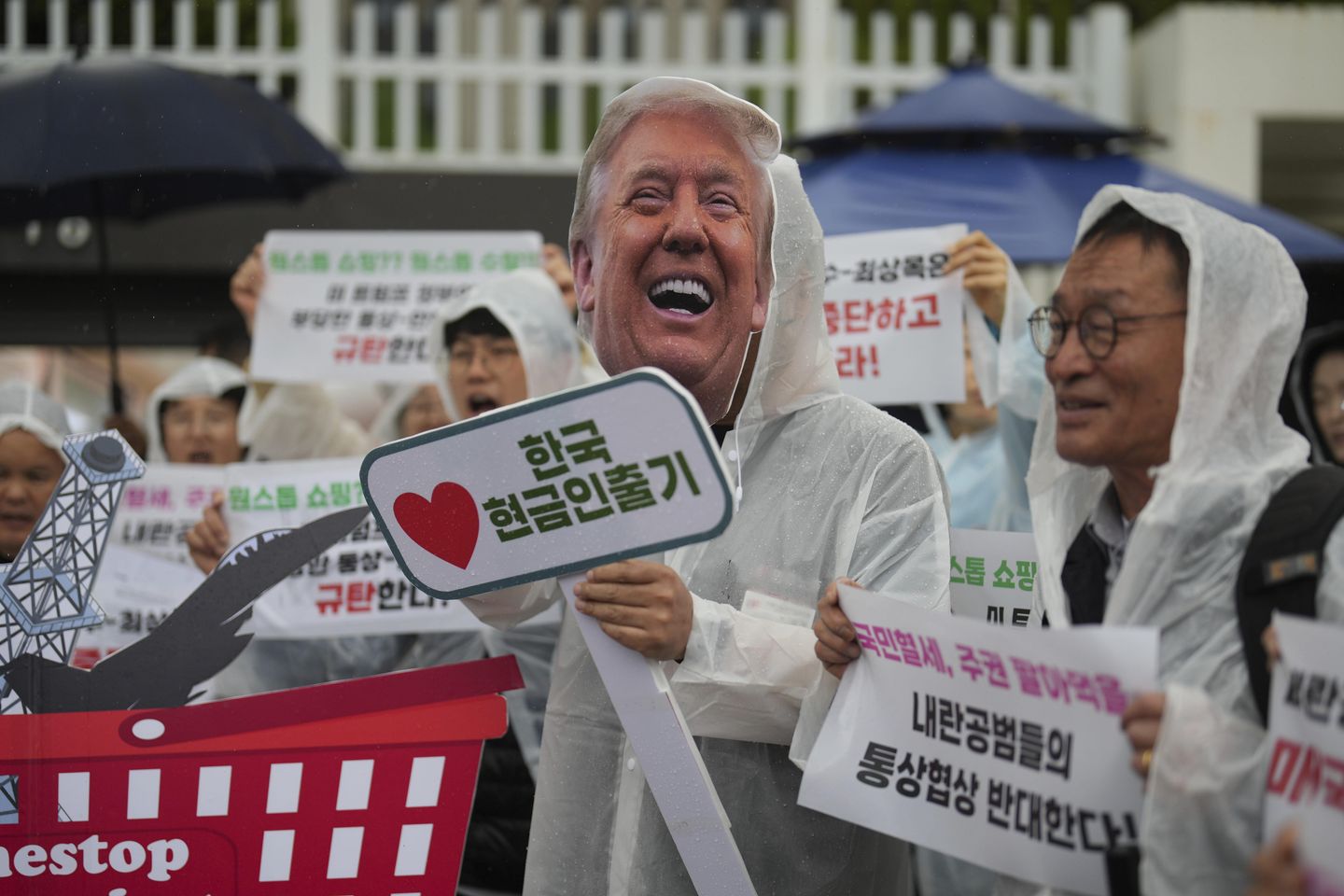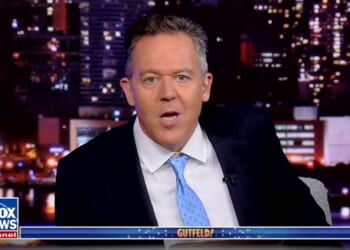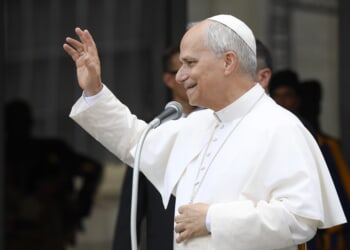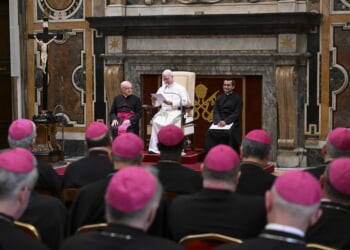
SEOUL, South Korea — Foreign relations experts are worrying that the leaders of Seoul and Washington could do what no enemy has managed in 75 years: Fray the two democracies’ alliance to the breaking point.
In Southeast Asia Friday, top diplomats from Seoul, Tokyo and Washington huddled. On the same day in Northeast Asia, warplanes from the three nations drilled together in the clouds over a strategic island, while generals talked regional deterrence.
Those cheery photo ops and upbeat military vibes, however, may not allay deeper fears.
In Washington, concerns are simmering that South Korea’s newly elected liberal president, Lee Jae-myung, could degrade the bilateral alliance.
And in Seoul, those sentiments are mirrored in fears that President Trump’s intermingling of commercial and strategic issues could hurt the relationship, specifically if he were to link his promised tariffs on South Korea with the U.S. military’s presence there.
Diplomats chat, chiefs talk, warplanes thunder
Top diplomats from the U.S., South Korea and Japan met for 40 minutes Friday on the sidelines of the Association of Southeast Asian Nations summit in Kuala Lumpur, Malaysia
While none of the three countries is an ASEAN member, attending the meeting were Secretary of State Marco Rubio, Japanese Foreign Minister Takeshi Iwaya and South Korean Vice Foreign Minister Park Yoon-joo. Mr. Park was deployed as the foreign minister-appointee of the Lee administration, which took office in June, is undergoing hearings.
The trio affirmed their resolute commitment to North Korean denuclearization, per Korean media.
Also Friday, but in Seoul, the top military brass of all three nations held their annual meeting.
“We’re illuminating a future path together, a path where partnerships can evolve through persistent and regular engagement from building capacity to really sharing responsibility,” Chairman of the Joint Chiefs of Staff General Dan Caine told his counterparts, noting that North Korea and China are “undergoing an unprecedented military build-up with a clear and unambiguous intent to move forward with their own agendas.”
And South Korean and Japanese jets drilled with a U.S. B-52 strategic bomber in international airspace close to South Korea’s Jeju Island.
The holiday isle enjoys a near-perfect strategic location south of the peninsula and northeast of Shanghai at the convergence of the Yellow and East China seas.
Chinese naval bases, naval shipyards and one of Beijing’s three fleet commands lie on the Yellow Sea littoral. Moreover, any North Korean warship seeking to cross from the peninsula’s east coast to its west coast — or vice versa — must traverse the area.
Jeju’s naval base offers South Korean and visiting U.S. assets an ideal staging point for regional operations inside the First Island Chain.
Despite Friday’s multiple, amicable gatherings, pundits fret over the relationship.
Lee: New pragmatist or old leftist?
Some pundits consider Mr. Lee, who took power in June after conservative President Yoon Suk Yeol’s impeachment following his martial law attempt in December, an unreformed radical.
Formerly known to despise Japan and favor better ties with China and North Korea, Mr. Lee pivoted once the Blue House came within reach.
He rebranded his liberal Democratic Party of Korea as “center right” and talked of “pragmatic” politics. He vowed to maintain Seoul’s alliance with the U.S. and its emergent trilateral ties with Japan — ties long-desired by the U.S. and championed by Mr. Yoon.
So far, he has kept his word.
His first major diplomatic engagement was with Japanese Premier Shigeru Ishiba at the June Group of Seven summit in Canada. That went so well that Mr. Ishiba visited the Korean Embassy in Tokyo days later to celebrate six decades of diplomatic ties.
And Mr. Lee’s national security adviser, visiting Washington in recent days, urged Mr. Rubio to set up a Lee-Trump meeting.
None of that has stopped U.S. conservatives from issuing dire warnings.
In a June op-ed in The Hill, conservative pundit Gordon Chang wrote that Mr. Lee “almost certainly wants American troops off South Korean soil,” citing comments made earlier in his career that they are “an occupying force.”
He warned that Mr. Lee may govern as “an anti-American, pro-China, pro-North Korea leftist.”
Any Korean president seeking to end the U.S. alliance faces an uphill battle. A 2025 poll by Seoul’s Asan Institute found that 96% of Koreans consider the alliance necessary and support for GIs in Korea stood at 80.1%.
“The whole development of South Korea was made possible under the umbrella provided by the U.S.” said Michael Breen, Seoul-based author of “The New Koreans.” “Neither side of the political aisle since Korea became a democracy has wanted to change that.”
Seoul’s previous liberal government, under President Moon Jae-in from 2017-2022, dragged relations with Tokyo to all-time lows. However, though Mr. Moon held summits with North Korea’s leader more often than any prior Seoul president, he neither broke sanctions against Pyongyang nor ended the U.S. alliance.
“Some elements in Lee’s party are anti-U.S. but they are fringe … he will be as pragmatic as possible,” predicted Jeffrey Robertson, an international relations expert at Seoul’s Yonsei University. “Like all former progressive presidents, he will stick to the center line.”
Concerns about Trump’s Korea strategy
Some fear the latest news coming out of Washington.
“It depends on who Trump is listening to in the U.S.,” Mr. Robertson said. “If he gets the idea that Lee is anti-U.S … that is illegitimate.”
Potential cuts to U.S. Forces Korea, or “flexible” use of the forces for off-peninsula roles, could be in play. In a Cabinet meeting this week, Mr. Trump raised the issue of South Korea paying more for GIs stationed there.
More disturbing for some is Mr. Trump’s habit of packaging together separate issues.
“Trump is tying trade and security together and I don’t agree with that, I think they should be separate,” said Chun In-bum, a retired South Korean general. “He is describing USFK as a bargaining chip, and that is really disturbing.”
The ploy, he said, could blow back by playing to Seoul’s hard left.
“As some Korean progressives don’t see North Korea as a security threat, they may accept a trade-off — U.S. troop cuts for tariffs — which is ridiculous,” Mr. Chun said.
Mr. Trump said this week he would levy 25% tariffs on South Korea starting Aug. 1 if a trade deal between the two countries isn’t reached before then.
Other Koreans fear tariffs could reignite mass anti-Americanism, dormant in South Korea since the 2008 protests over U.S. beef imports.
“If Trump wages tariff war against South Korea, threatens to withdraw U.S. forces and demands increased defense spending and burden sharing, I think the majority of South Koreans will be critical of him and the U.S.” said a Seoul-based academic with ties to the Lee government.
Minefields also lie ahead in the diplomatic space.
“Lee has made it clear he wants to keep the alliance and honor trilateral relations,” said the academic, who spoke off the record as he did not want to be considered an administration spokesperson. “However, he also wants a cooperative partnership with China and better diplomatic ties with Russia.”




![Steak ’n Shake Mocks Cracker Barrel Over Identity-Erasing Rebrand [WATCH]](https://www.right2024.com/wp-content/uploads/2025/08/Steak-n-Shake-Mocks-Cracker-Barrel-Over-Identity-Erasing-Rebrand-WATCH-350x250.jpg)



![Soros Network, Others Behind LA Riots [WATCH]](https://www.right2024.com/wp-content/uploads/2025/06/Soros-Network-Others-Behind-LA-Riots-WATCH-350x250.jpg)
![Human Trafficking Expert Details Horrific Biden Admin Endangerment of Migrant Kids [WATCH]](https://www.right2024.com/wp-content/uploads/2025/07/Human-Trafficking-Expert-Details-Horrific-Biden-Admin-Endangerment-of-Migrant-350x250.jpg)






